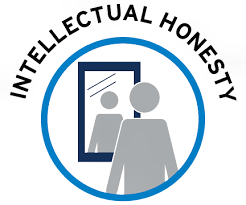What Is This Thing You Call Intellectual Honesty?
 Intellectual honesty means telling the truth. It is really that simple. Okay, well, it is a little more complicated, but… we didn’t want to worry you!
Intellectual honesty means telling the truth. It is really that simple. Okay, well, it is a little more complicated, but… we didn’t want to worry you!
The good news is that the above sentence is not entirely wasted. Since it provides an excellent example of not being intellectually honest!
Intellectual honesty does refer to telling the truth. But it is more than that. It means being honest with yourself. It means not self-gaslighting. It means applying the same standards to all situations equally, and judging things to be good or bad in as unbiased a manner as possible.
Being Honest With Yourself
We all like to lie to ourselves! It makes us feel better. “This piece of cheese doesn’t count against my diet, because I ate it while standing next to the fridge!”, “It’s okay that I was rude to Mary. She was rude to me first!”, “I can stay up all night playing video games, and still be ready to work tomorrow.”
Unfortunately, all to often we tend to believe our own lies. Which leads us towards being less successful. On the one hand, lying to ourselves absolves us of having to feel guilty! “It is their fault that I yelled at them.” On the other hand, it keeps us from growing, and becoming a better person.
Ask yourself: What is to be gained from being dishonest with myself? Is the artificial freedom from guilt really worth the price you pay?
Don’t Self-Gaslight
What does gaslighting refer to? It is a process where a manipulator convinces someone else that they are going crazy, or that they are in the wrong. They do this by creating a false narrative about the world, and then immersing the person in it. Eventually the person comes to believe that the false reality is true.
When we are not intellectually honest, we often end up gaslighting ourselves. We convince ourselves that a particular reality is absolutely true, when it may really be nothing more than a figment of our own creative mind.
Thus, a lack of intellectual honesty can immerse and trap us in an understanding of the world that isn’t reflective of reality.
Applying The Same Standards To All Situations
We all have different values, and that is okay. In fact, it is wonderful! We celebrate these differences! What matters is not that we all have the same values. Rather, what matters is that as individuals, we apply our own values evenly and fairly to all situations.
For example, let’s suppose that a politician who I support promotes a particular public policy. Since I like that politician, I might also decide that I support that policy. Now suppose that a year later a politician who I can’t stand now also supports the same policy, while the person who I like has changed their public position and no longer support the policy.
Where do I now stand on that policy? An intellectually honest person supports policies based on their values, not based on the persons who are in favor or opposed to them.
It is one thing to alter your views because the circumstances change, or you learn more facts about a policy. It is another to alter them based solely on which side is supporting them, and which side is opposed to them.
Ah, but see, this is where it gets tricky! Because it is super easy to fool ourselves (self-gaslight) into thinking that we have changed our minds because the circumstances have changed, when they really haven’t. It is easy to convince ourselves that we are being thoughtful, when really all we are doing is supporting one side of a political divide over another.
Before you allow yourself the luxury of drawing any conclusions, ask yourself if you are applying your values fairly and honestly.

